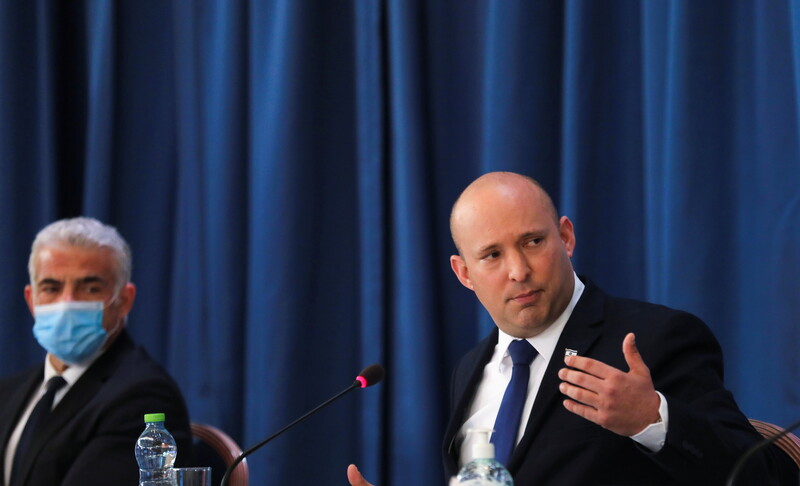Power Suits 29 September 2021

New Israeli leaders, same old, same old, same old.
ReutersSo much sound and so much fury. So very little action.
It seems that the peace process industry is cranking into gear again, even though both Israel and the US have made explicitly clear that there is nothing to see here.
In fact, so determined was Israeli Prime Minister Naftali Bennett to dampen any expectations that in his speech to the UN’s General Assembly on Monday, he completely omitted mention of the Palestinians.
Yet none of that seems to have put off European officials.
The EU has been fawning over remarks on Gaza by an Israeli foreign minister who has said nothing new – he doesn’t like Hamas – and promised even less – if Hamas wasn’t there then maybe Israel would contemplate easing a draconian closure on Gaza that has pushed two million people to the brink of humanitarian disaster.
Yair Lapid’s comments nevertheless occasioned optimism from Denmark’s ambassador to Israel as well as in Sweden, whose previously frosty relations with Israel seem to have warmed inexplicably.
It’s odd, made odder by the fact that Lapid is head of a ministry which openly celebrated cancellations at this year’s Durban conference against racism. Though, perhaps not that odd considering that Sweden and Denmark both joined a “boycott” of Durban IV at Israel’s prompting.(Apparently boycotts are fine if Israel wants them. Otherwise, not so much.)
Indeed, Israel’s foreign ministry thanked the 37 countries, including the US, Canada and the UK, for what Israeli media reported as their “support” in undermining the international effort to combat racism.
Lovely.
It’s a mystery
So why the excitement?
September’s opening session of the UN General Assembly may have something to do with it.
Before Bennett ignored the Palestinians, US President Joe Biden had made sure to distance himself from the position of his predecessor Donald Trump by stating that the US supports a two-state solution.
But he did so only, he said, because he believed that this was “the best way” to ensure Israel’s future.
Not, of course, out of any commitment to Palestinian rights or international law.
Nor was there any suggestion of urgency.
“We’re a long way from that goal at this moment,” Biden continued, though he vowed not “to give up on the possibility of progress.”
It was hardly a ringing endorsement of the kind of outcome the EU sees as a “fundamental interest.”
Nor can the excitement have been occasioned by any position from Bennett.
On the contrary. Bennett has tried his best to dampen expectations. There will be no Palestinian state on his watch, he told The New York Times ahead of meeting Biden in Washington last month.
There will be a continuation of settlement construction, even if he has dropped his former support for the formal annexation of these settlements.
And there will be no peace talks with the Palestinian Authority leadership in the West Bank (to everyone’s relief).
“This government will neither annex nor form a Palestinian state, everyone gets that,” Bennett said. “I’m prime minister of all Israelis, and what I’m doing now is finding the middle ground — how we can focus on what we agree upon.”
The “we” here is of course Israel and the US, a periodic reminder that, as it always has been, the Palestinian future is to be determined by Israel and Israel’s supporters in Washington.
So why are European countries getting all excited about a threadbare Israeli coalition government that offers no new thinking?
Trauma
Are EU countries simply so traumatized by the years of Benjamin Netanyahu that they’ve forgotten that Netanyahu was a symptom, not a cause of the problem?
Have they been so blindsided by their glaring double-standards that any fig leaf, however pitiful, is seized upon to justify a verbal commitment to human rights and an actual commitment to military occupation?
Did they forget that the new Israeli prime minister not long ago urged Israel to end cooperation with the EU over settlements?
Do they believe that a motion passing through US Congress – the so-called Two-State Solution Act – even in the unlikely event that it passes, will change anything?
Probably not. As the ancient saying – passed down from generation to generation – goes, the EU is a payer, not a player.
In this context it makes perfect sense for Denmark on the one hand to laud the empty rhetoric of Lapid while, on the other, fund the Palestinian Authority to the tune of $72 million over five years.
There is no strategy here. There is no endgame. This is hush money. Conflict management via the wallet.
The real decisions are made in Washington and on Israel’s terms.
The shock and horror expressed over a two-day delay in handing over an extra $1 billion of US taxpayer dough to Israel is far more indicative of where the wind is blowing.
There will be no change until either the Palestinians take on more suffering and reject the hush money, Americans become sufficiently embarrassed by their obsequiousness or Europeans lose at least one of their faces.




